A Letter to Three Wives Blu-ray Movie
HomeA Letter to Three Wives Blu-ray Movie 
Fox Studio Classics20th Century Fox | 1949 | 103 min | Not rated | Sep 17, 2013
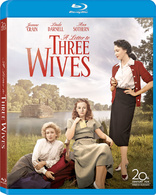
Movie rating
7.3 | / 10 |
Blu-ray rating
| Users | 4.5 | |
| Reviewer | 4.0 | |
| Overall | 4.1 |
Overview
A Letter to Three Wives (1949)
A letter is addressed to three wives from their "best friend" Addie Ross, announcing that she is running away with one of their husbands--but she doesn't say which one.
Starring: Jeanne Crain, Linda Darnell, Ann Sothern, Kirk Douglas, Paul Douglas (I)Director: Joseph L. Mankiewicz
| Romance | Uncertain |
| Drama | Uncertain |
Specifications
Video
Video codec: MPEG-4 AVC
Video resolution: 1080p
Aspect ratio: 1.33:1
Original aspect ratio: 1.37:1
Audio
English: DTS-HD Master Audio Mono (48kHz, 24-bit)
English: Dolby Digital 2.0 (224 kbps)
Subtitles
English SDH, French, Japanese, Spanish
Discs
50GB Blu-ray Disc
Single disc (1 BD)
Playback
Region free
Review
Rating summary
| Movie | 4.5 | |
| Video | 4.5 | |
| Audio | 3.5 | |
| Extras | 3.0 | |
| Overall | 4.0 |
A Letter to Three Wives Blu-ray Movie Review
Countdown.
Reviewed by Jeffrey Kauffman September 18, 2013Five wives, four wives, three wives—unless you’re a Darger, who’s counting? Cosmopolitan magazine originally published John Klempner’s novel as A Letter to Five Wives, and after the story was optioned by 20th Century Fox, Vera Caspary, who did the initial adaptation, jettisoned one spouse and turned in a draft entitled A Letter to Four Wives. When Joseph L. Mankiewicz came on board as both scenarist and director (after a number of other intermediary talents were attached as either writer or helmsman), he still found the film unwieldy, and as his son Chris relates in the interesting commentary included on this Blu-ray, kept snipping away at scenes in order to try to get things down to a reasonable running time, ultimately without success. He went to studio chief—and Mankiewicz nemesis—Darryl F. Zanuck, who offered the perhaps obvious solution: do away with one more wife. And so A Letter to Three (Count ‘Em) Wives was born, a rather interesting feature in Mankiewicz’s filmography, and one that is balanced quite neatly between an at times sudsy melodramatic aspect and some witty, and even occasionally lowbrow, comedy. The film was an enormous success for Fox in 1949, and went on to receive a fitting trio of Academy Award nominations, ultimately winning two for Mankiewicz for Best Director and Best Screenplay (it lost Best Picture to All the King’s Men). The film is notable for its structure, offering three vignettes for each of the troubled marriages at the heart of the story, as well as for never really showing the supposed femme fatale who has come between each of the focal women and their husbands, running off with one of them (which one provides the motivating mystery behind the film).
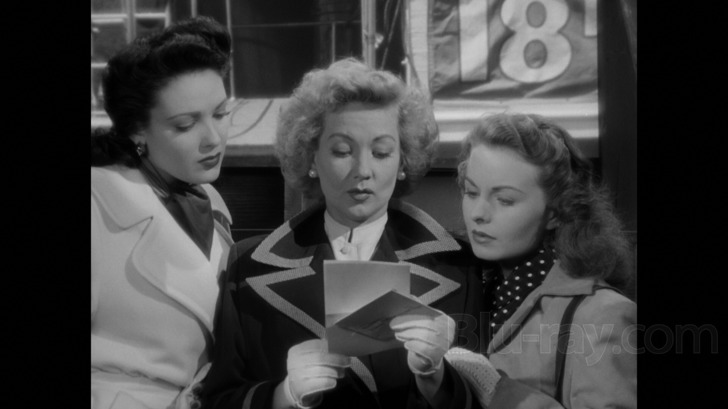
Deborah Bishop (Jeanne Crain) is a former Navy WAVE who is now the dutiful wife Brad (Jeffrey Lynn), a member of the social elite, a fact that makes Deborah uncomfortable and insecure. Deborah is comforted by Rita Phipps (Ann Sothern), an older but perhaps not significantly wiser woman who has marriage troubles of her own, owing to the fact that she makes more money writing for a radio soap opera than her husband George (Kirk Douglas) does as a teacher. Deborah has an embarrassing moment at a dinner at Brad’s country club, something witnessed just by Rita and George, but by another couple, Lora Mae (Linda Darnell) and Porter Hollingsway (Paul Douglas). Porter is wealthy but quite a bit older than Lora Mae, and Lora Mae, a bit like Deborah, comes from a less than cultured background and perhaps feels outmatched. An enigmatic woman named Addie Ross (voiced by Celeste Holm in the film’s bookending voice overs) has been a third wheel of sorts in all three of these marriages, and though the film never shows her (aside from a brief shot from the back which is partially masked in any case), Addie’s influence permeates A Letter to Three Wives from virtually the first moment, becoming unavoidable when the titular letter is delivered to the three women as they’re preparing to take an outing with some underprivileged children. The letter divulges that Addie has left town—with one of their husbands.
Once the letter is delivered, we get a series of three flashbacks that provide little windows into each of these women’s stories and, especially, marriages. Deborah’s is beset by some incipient class differences, as well as the subtext that she was a working woman during the war and now needs to content herself with being a housewife (just one of the rather forward looking plot points the film dallies in). Rita’s issue is that she still is a working woman and is doing much better than her husband is, albeit in a pointedly more “meaningless” career than his noble profession of teaching. And Lora Mae has a situation somewhat similar to Deborah’s, one rife with class differences, but in this case exacerbated by age differences as well.
In fact if there’s a fault to be found with A Letter to Three Wives—and some may find me brain dead (get in line, please) for even suggesting such a thing—it’s that the bookending segments given over to Deborah and Lora Mae have at least a surface similarity, even if there are notable differences between them. The opening flashback is arguably the weakest of the three, perhaps because it has little of the ebullient humor of the other two (that humor is probably reserved for the opening dance sequence, when Deborah’s awful dress gets her into trouble—twice). While the Lora Mae flashback has a definite comic sensibility (especially with the running gag about not just living on the wrong side of the tracks—more or less living on the tracks), it’s the central sequence depicting Rita and George Phipps’ marriage where Mankiewicz’s native intelligence and flair for dryly witty dialogue is used to its best advantage.
It’s in fact in the central (both physically within the film as well as content wise) dinner party where Mankiewicz delivers some of the film's most trenchant bon mots as George, a devotee of Brahms (read: high culture) comes into conflict with Rita’s boss, Mrs. Manleigh (played by a hilarious Florence Bates), who produces a low rent radio soap opera. Mankiewicz’s career was often about the marriage of Art and Popular Culture, and in this wonderful segment he is able to give voice to what must have been one of his recurring frustrations—namely, trying to craft something smart which also appealed to the “common man” (and/or woman). This sequence is also buoyed by the typically acerbic contributions of the always memorable Thelma Ritter as a supposed maid waiting on the dinner guests.
The film cops out, if only just a little, in its closing moments, perhaps due to the era’s preference for tidy happy endings, but even here Mankiewicz is able to portray a very realistic moment in a marriage. How many times have you pretended not to hear something your spouse has said in order to keep the peace (or salvage a relationship)? A Letter to Three Wives may find its genesis in a handwritten note, but it’s really about the spoken word—whether or not a response is required.
A Letter to Three Wives Blu-ray Movie, Video Quality 
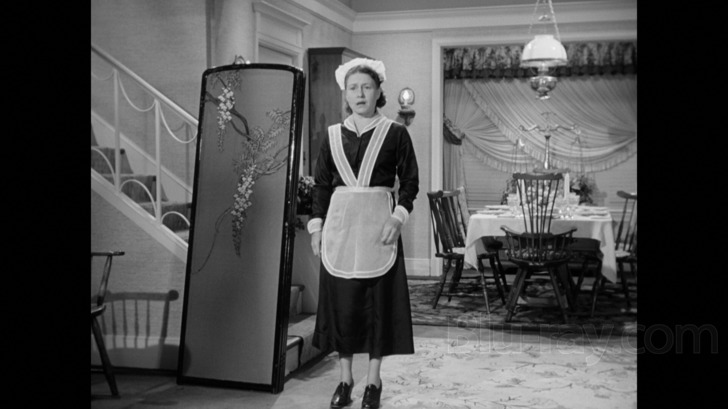
A Letter to Three Wives is presented on Blu-ray courtesy of 20th Century Fox Home Entertainment with an AVC encoded 1080p transfer in 1.33:1. This is "merely" another fantastic looking catalog release from Fox, which continues to offer generally superior accounts of their archival assets. The image here is very nicely detailed and sharp looking, offering an excellently film like appearance which retains a very natural looking layer of grain. Contrast is sharp and consistent, and there are very few signs of damage to the elements. The presentation is largely artifact free, though there are a couple of very minor issues with shimmer on some of the closely crosshatched patterns in things like some of the suit jackets.
A Letter to Three Wives Blu-ray Movie, Audio Quality 
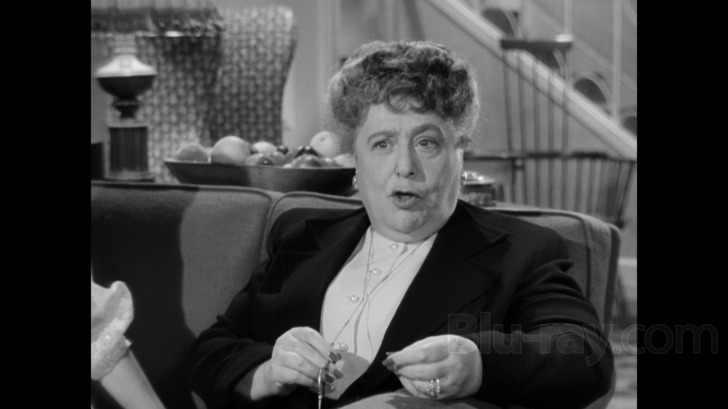
A Letter to Three Wives' lossless DTS-HD Master Audio Mono mix offers a solid if slightly narrow accounting of the soundtrack, one that's at least a bit notable for Alfred Newman's foray into a kind of quasi-big band sound for some of his cues. Dialogue is very cleanly presented, and though there's no real damage to report, the high end here sounds slightly thin at times.
A Letter to Three Wives Blu-ray Movie, Special Features and Extras 

- Commentary with Kenneth Geist, Cheryl Lower and Christopher Mankiewicz. This is a wonderfully informative commentary. The three participants seem to have been recorded separately, but they've been very smartly edited together, providing a context rich "discussion" between them. There's great background here on Mankiewicz's battles with Zanuck as well as more typical biographical information on most of the major players.
- Biography: Linda Darnell "Fallen Angel" (480i; 44:03) is the typically fine Biography overview, giving us a nice account of Darnell's rather short and ultimately tragic life.
- Fox Movietone News: Oscars Presented for Achievements in Motion Pictures (480i; 1:15) is a brief documentation of the 22nd Annual Academy Awards, showing the arrival of such luminaries as the Zanucks, as well as the participation of cast members and wins by Joseph Mankiewicz.
- Theatrical Trailer (480i; 2:43)
A Letter to Three Wives Blu-ray Movie, Overall Score and Recommendation 
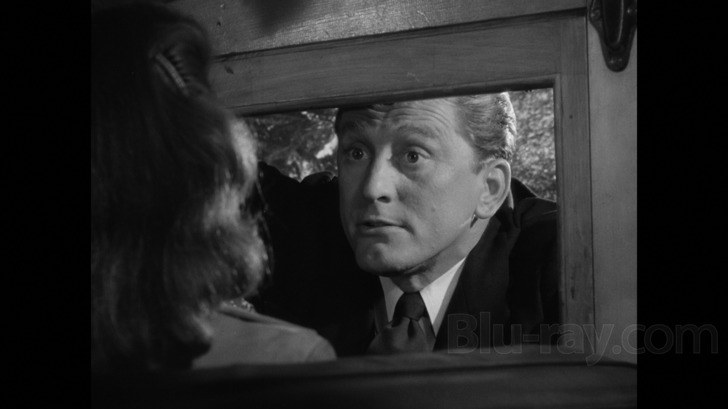
A Letter to Three Wives is sometimes thought of as only an admittedly enjoyable overture to Mankiewicz's classic All About Eve, which followed around a year later. But the two films are manifestly different. There's no question that Eve is the more acerbic of the two films, and is of course filled to the brim with a jaded eye glaring rather insouciantly at the vagaries of show business. But in its own relatively quieter way, A Letter to Three Wives is perhaps the more socially conscious film, one which manages to delve into all sorts of interpersonal and even socioeconomic issues that were confronting people during this era. This Blu-ray is yet another great catalog release from Fox, and it comes Highly recommended.
Similar titles
Similar titles you might also like

Dodsworth
Warner Archive Collection
1936

Some Came Running
Warner Archive Collection
1958

Madame Bovary
Warner Archive Collection
1949

Now, Voyager
1942

Ship of Fools
1965

Imitation of Life
1934

Mrs. Miniver
1942

Miss Annie Rooney
1942

Maurice
1987

The Woman Between
1931

Wuthering Heights
1970

Yanks
Limited Edition to 3000
1979

Wild River
Fox Studio Classics
1960

A Place in the Sun
Paramount Presents #22
1951

Forbidden
1932

I Know Where I'm Going! 4K
1945

Love Affair
1939

Great Expectations
1946

Vanity Fair
2004

Gentleman's Agreement
Fox Studio Classics
1947